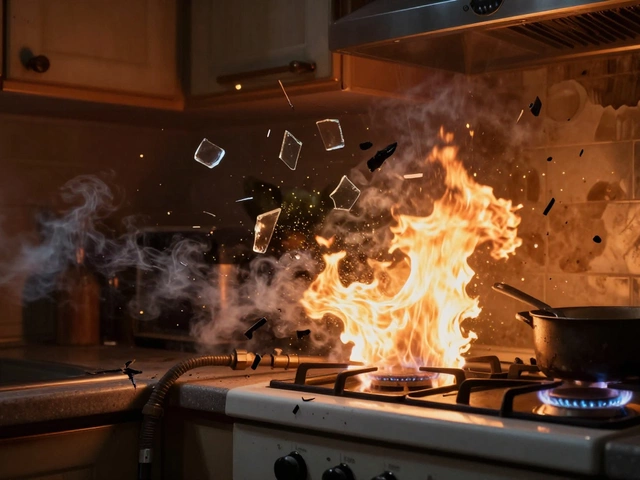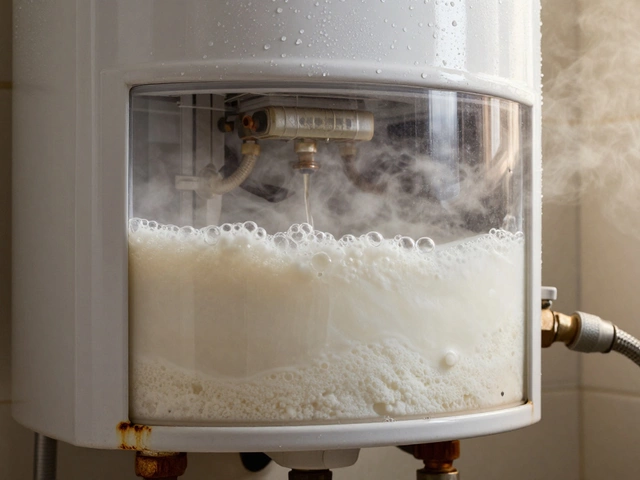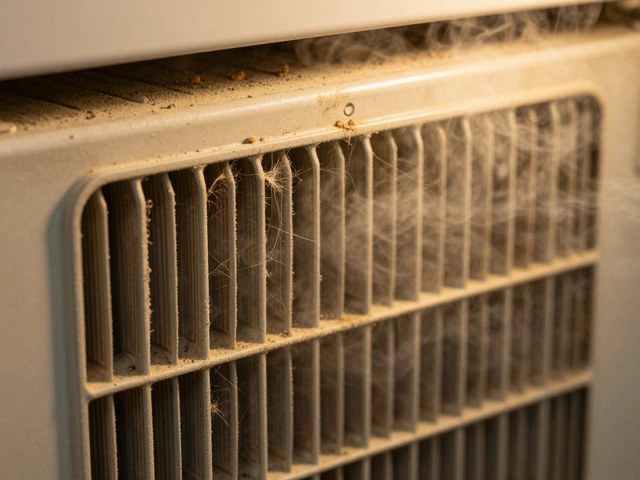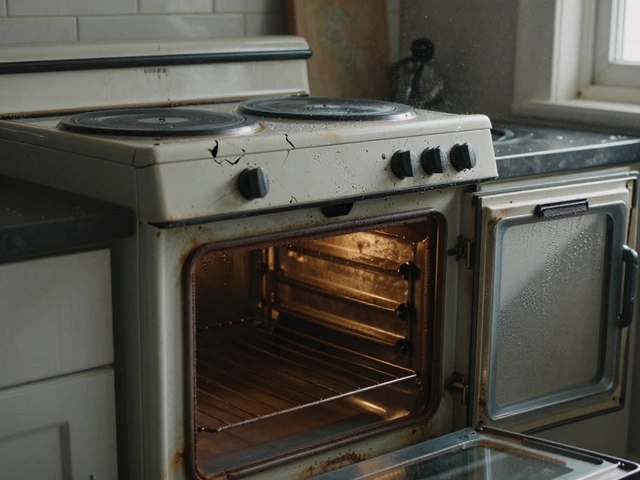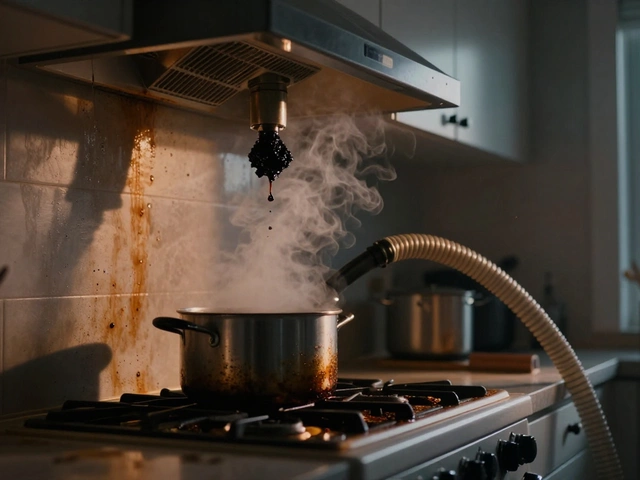When your boiler decides to take an untimely break, it can feel like the chill seeps into your bones almost instantly. Boilers are the unsung heroes of our homes, providing the warmth that keeps us comfortable through the harshest days. But what happens when something goes wrong? Are there steps you can take before resorting to dialing a professional service number?
Tackling boiler woes on your own might seem intimidating, but many issues are accessible to fix with just a bit of knowledge and precaution. This guide shines a light on the process of repairing your boiler, offering practical advice and ensuring that you undertake any task with the utmost safety in mind. Before you roll up your sleeves, let's explore what repairs you can feasibly manage – and most importantly, when it's time to bring in an expert.
- Understanding Your Boiler
- Common Boiler Problems
- Safety First
- DIY Fixes You Can Try
- Knowing When to Call a Professional
Understanding Your Boiler
Before diving into DIY boiler repair, it's crucial to grasp the basic workings of this essential home appliance. At its core, a boiler operates by heating water, turning it into steam or hot water, which is then circulated throughout your home via radiators, underfloor heating, or storage tanks. This process not only keeps your household warm but also supplies you with hot water for daily tasks. For those with a modern condensing boiler, the process becomes even more efficient, as it captures and recycles latent heat that would otherwise escape with traditional boilers.
There are several types of boilers in use today - from conventional, system to combi boilers. Each one functions slightly differently. For example, the combination or 'combi' boiler is a compact, highly efficient unit that provides on-demand hot water without the need for a separate storage tank. This popularity has surged among city dwellers with limited space. On the other hand, system boilers store hot water in a cylinder, meeting the needs of larger homes with higher water demands. Understanding which type you own will guide you in maintenance and repair, as well as help you in diagnosing potential problems more efficiently.
A boiler's anatomy is fairly complex, comprising several key components that work in harmony. These include the burner, heat exchanger, circulation pumps, and a series of controls to regulate temperature and pressure. The burner is responsible for igniting the fuel (gas, oil, or electricity) to create heat. This heat passes through the heat exchanger, warming up the water. If you're conscious about maintenance, pay close attention to the modulation of the boiler's controls, which ensure temperature demands are met without wasting fuel or compromising safety.
It's critical to be acquainted with the basic safety mechanisms integrated into modern boilers, such as pressure relief valves and thermostats. These components are designed to prevent overheating or pressure build-ups that can lead to more severe issues. Always ensure these systems are functioning correctly when you handle any repair tasks. As Bob Vila, a home improvement expert, once said,
"Understanding your home’s heating system is not just about comfort—it’s about energy efficiency and safety."
Moreover, on your journey to mastering boiler repair, familiarize yourself with common indicators of boiler trouble. For instance, if you hear banging noises, this could be a sign of kettling—a condition where limescale accumulates within the heat exchanger. Meanwhile, if your boiler frequently turns off, it could point to a faulty thermostat or an airlock in the system. By knowing these signs, you're better equipped to tackle minor fixes or communicate effectively with a professional when needed.
A handy tip: always keep your boiler’s manual at the ready. Not only does it serve as a guide for specific upkeep procedures and troubleshooting, but it also contains valuable information for setting up the system optimally. If a specific issue eludes resolution, reaching out to the manufacturer for additional support can also be beneficial. Being proactive in learning about your boiler's functions and care ensures you stay warm and reduce the frequency of problems, managing issues before they escalate into costly repairs.
Common Boiler Problems
Dealing with boiler issues can be a frustrating experience, especially when the frost is biting outside. However, understanding these problems helps demystify the potential causes and solutions. Perhaps the most frequent issue encountered by homeowners is a boiler that won't heat up. If you're finding no heat coming from your radiators, the problem could stem from anything as minor as a burst pipe to more complex issues involving the thermostat or the pilot light. Checking for draftiness around windows and doors or malfunctioning thermostats can provide clues, as these often conspire to keep your home chilly despite the boiler's best efforts.
Another common woe is a boiler making strange noises. When you hear banging, clunking, or gurgling sounds, it might raise alarm bells, but many times, the cause is more benign than it seems. These noises can often be attributed to issues with air in the system or a build-up of sludge in radiators. Bleeding radiators is a tried-and-true method for dealing with trapped air. If these measures don't work, the issue might be more serious, like a faulty heat pump.
Boiler engineers at Which? assert, "Most boiler faults can be traced back to two primary issues: a lack of regular maintenance and incorrect pressure settings."
Low boiler pressure is yet another nagging concern that can cause your system to underperform. Pressure settings act like the heartbeat of your boiler - too low, and the heat may not circulate effectively; too high, and the system can be inefficient or even dangerous. Always make sure the pressure gauge is between 1 and 2 bars. Re-pressurizing involves no more than a few simple steps, usually guided by your boiler's manual, making it accessible to most handy homeowners.
A seemingly innocuous issue is water leaks. Boiler leaks can lead to much more severe problems if left unattended. Water pooling beneath your boiler or dampness around the system may indicate corrosion within your system's pipes or joints loosening over time. Both situations require your attention swiftly. Ignoring these signs might lead to floor damage or, worse, internal parts of the boiler rusting away. While some small leaks can be fixed by tightening the nuts, serious leaks should always be addressed by professionals.
Sometimes, boilers can suffer from some downtime, most commonly manifesting as the system switching off unexpectedly. The reasons behind random boiler shut-offs can be wide-ranging, involving anything from thermostat breakdowns to issues with the electric mains. Checking thermostat settings, as well as ensuring your electrical supply is stable, can sometimes resolve the issue. However, if the problem persists, it might be time for a technician to take a look.
These common problems, though certainly bothersome, need not leave you out in the cold. Armed with some boiler know-how, many homeowners can make simple fixes themselves. However, always bear in mind that while DIY boiler repair is safe for certain minor faults, intricate issues call for professional intervention. Don't hesitate to contact a service expert if you ever feel your DIY efforts venturing beyond your comfort zone.

Safety First
Before embarking on any DIY boiler repair, safety must be your top priority. Boilers, while generally reliable, contain components that can pose significant risks, particularly if mishandled. A boiler's combination of water, electricity, and, in some cases, explosive gases like natural gas or oil, demands specific precautions to avoid serious accidents. It's crucial to begin any repair session by ensuring the boiler is completely powered down. Unplug the unit and turn off any relevant power supplies to lower the chance of electrical shocks. Additionally, if your boiler runs on gas, find the isolation valve and shut off the gas flow to prevent leaks or accidental combustion.
Recognizing potential gas leaks is another vital aspect of safety. Leaks are often hinted at by the distinctive smell of rotten eggs or an unusual hissing sound near the tank. In case you suspect such a leak, vacate the area immediately and contact the gas company from a safe space. It's always better to err on the side of caution when dealing with gas. Remember, at the end of the day, no boiler issue is worth compromising your well-being.
Proper Ventilation and Knowledge of Carbon Monoxide Risks
Beyond immediate cautions, long-term safety is also about ensuring proper ventilation within the boiler space. Boilers need a conducive environment to operate safely. Adequate ventilation reduces the build-up of dangerous gases like carbon monoxide. This deadly gas, often odorless and invisible, can be a byproduct of boiler malfunction. Being able to recognize the symptoms of carbon monoxide poisoning, which include dizziness, nausea, or headaches, can be life-saving. Outfitting your space with a functioning carbon monoxide detector is a preventive step every homeowner should consider, providing peace of mind.
According to a statement from the Gas Safe Register,
"Having a carbon monoxide detector installed near your boiler could make all the difference. It's a simple, yet effective way of ensuring your household remains safe while keeping warm."It's these little precautions that create a safer home environment.
Wearing Appropriate Protective Gear
Protective gear is your friend during home maintenance projects. Equip yourself with durable gloves, safety goggles, and, if necessary, a dust mask, particularly if any dust or insulation might be disturbed while accessing your boiler. These precautions can protect against steam burns or other unexpected hazards, making your attempt at repairs both safe and effective.
Statistical Insights on Boiler Safety
Here's a quick glance at some enlightening data that underscores the importance of safety measures related to boiler repair:
| Year | Number of Boiler Related Incidents | Prevention with Simple Safety Measures |
|---|---|---|
| 2020 | 200 | 80% |
| 2023 | 150 | 85% |
This table reflects an increased awareness and adoption of preventive safety measures among homeowners, leading to a noticeable decrease in incidents. Adopting these straightforward strategies can help you join the ranks of informed and cautious boiler owners.
DIY Fixes You Can Try
When it comes to boiler repair, it's often the little things that you can handle yourself, saving both time and money. One of the very first things you should check if your boiler is acting up is the thermostat. Make sure the settings haven’t been changed accidentally. Some thermostats can glitch and need a simple battery change or a reset to get back in gear. If you suspect this could be the issue, consult your thermostat’s manual for a reset procedure. Starting here can often save a call to a technician and have your heat back on in no time. While testing the thermostat, ensure that it’s not placed near heat sources like ovens or direct sunlight, as this can give it incorrect readings.
Another common issue that can easily be handled is checking and bleeding the radiators. Often, cold spots on your radiators mean there's trapped air inside, and bleeding them can be the straightforward fix. With a radiator key, gently open the valve of the problematic radiator until you hear the hiss of escaping air. Make sure to hold a rag underneath to catch any trickling water. Once water starts flowing smoothly, tighten the valve. This can vastly improve heating efficiency across your system without the need for professional help. Regular checks like this should be part of your home maintenance routine to ensure longevity and optimal performance of your heating system.
If your DIY boiler troubleshooting continues and the system won’t fire up, it could be an issue with the pilot light – if you have an older model – or the igniter. For pilot lights that won't stay lit, examine the color of the flame; it should be a steady blue. A yellow or orange flame can indicate dirt build-up or even carbon monoxide, which is a serious issue. Cleaning the area around the pilot or ensuring vents are clear could resolve this. If you have a newer boiler that doesn’t have a pilot light, you may need to check the electrical components and connections. Always remember to switch off the electricity before checking internal parts for safety.
In regards to pressure, a low or high reading can cause your boiler to cut out unexpectedly. The pressure should usually be between 1 and 2 bars when the system is cold. To increase pressure, locate the filling loop and slowly open its valves until you reach the desired measure on the pressure gauge. Once done, ensure the valves are fully closed. If pressure issues recur, it might be symptomatic of a leak elsewhere in your system or an indication of a faulty pressure relief valve. This adjustment is one of the simplest ways to get your heating back on track and feels particularly rewarding to accomplish on your own.
For energy efficiency concerns, checking for insulation around your hot water pipes is a great measure. Insulating piping can prevent heat loss and save energy, which is not just environmentally conscious but also economically savvy. Use foam tubing or fiberglass wraps that are widely available at most home improvement stores. This quick and simple fix boiler can enhance efficiency and offer consistent heating without frequent adjustments to the thermostat.
According to a report by the Energy Efficiency Office, "Properly maintained boilers can operate for up to 30% more efficiently compared to neglected ones, emphasizing the importance of regular DIY checks."In essence, a thorough understanding of your boiler system can empower you to carry out these simple yet effective DIY fixes, ensuring that your home remains a warm haven through each passing season. However, if any of these solutions feel outside your comfort zone, there's no harm in calling a seasoned professional to take over.
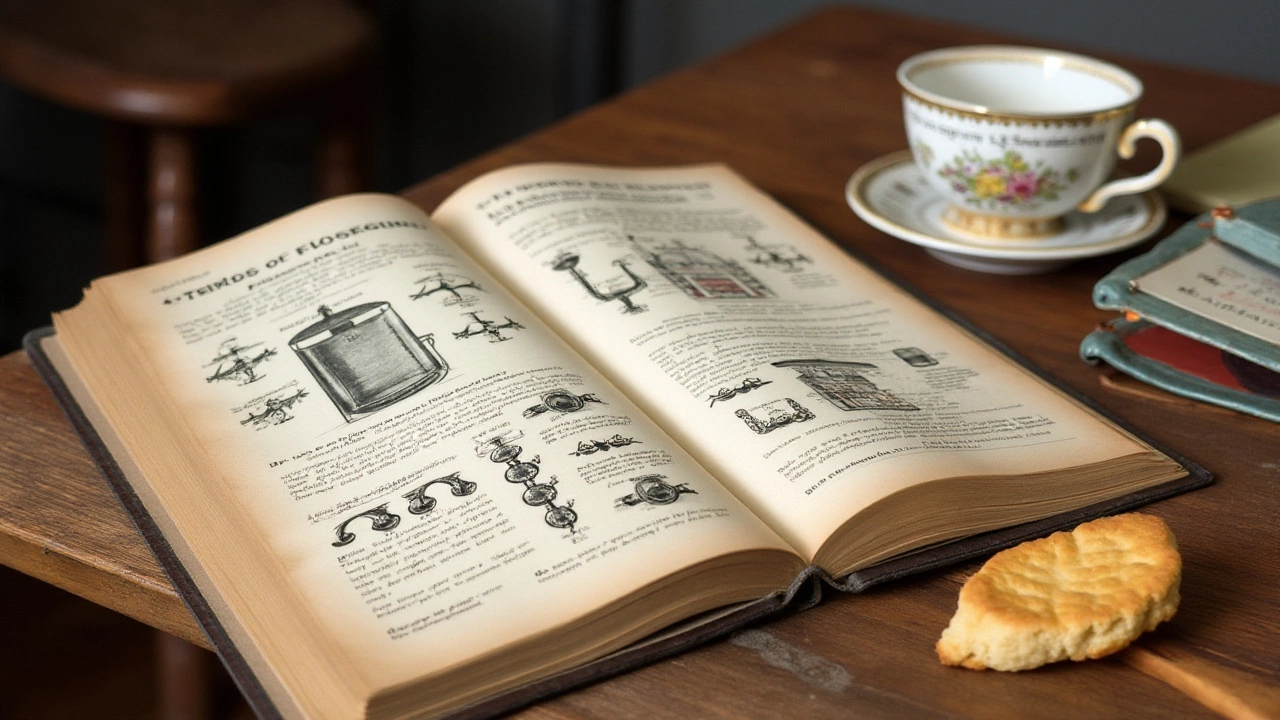
Knowing When to Call a Professional
Taking care of minor boiler troubles can certainly boost your confidence and save a few bucks. However, it is crucial to acknowledge the boundaries of DIY practices when it comes to boiler repair. When a boiler problem turns complex or potentially dangerous, the wise decision is to seek help from an experienced technician. But how do you identify those red flags that signal it's time to put down the wrench and reach for the phone?
A good rule of thumb is to recognize that issues involving gas or electricity typically warrant professional attention. For instance, if you detect a gas smell around your boiler, it's vital to vacate the premises and contact an expert immediately. The same principle applies to electrical issues. In situations where your boiler repeatedly trips the circuit breaker or displays erratic behavior that seems linked to electrical faults, the risk is too high to meddle with. They require the trained eye of a professional who understands the intricacies of gas and electrical systems.
Then there's the matter of consistent, unexplained boiler failures. Suppose your heating system runs smoothly one minute only to fall quiet without warning the next. Regularly experiencing such reliability issues may indicate deeper underlying problems, often beyond the reach of typical DIY fixes. A certified technician can diagnose the hidden causes often linked to complex internal components or failures within the system. Besides ensuring all issues are tackled effectively, professionals also provide a layer of safety and security that DIY attempts might lack.
"When in doubt, always ask for help. A minute of caution is worth countless hours of regret and repair," advises Alex Mason, a seasoned HVAC engineer with over 20 years of field experience.
Unusual sounds emanating from your boiler, such as banging, whistling, or gurgling, are typically indicative of mechanical failures or blockages that require immediate evaluation by someone with technical expertise. And if you notice any water leaks around or underneath your boiler, prompt attention is essential. Water leaks may stem from corroded pipes, faulty joints, or internal heating element failure, which if left unattended, could lead to extensive water damage or boiler malfunctions.
Last but not least, the age and maintenance history of your boiler play a significant role in deciding when to seek professional help. Older boilers, especially those beyond 10-15 years, are prone to breakdowns and inefficiencies that only experienced technicians can resolve or replace. Regular maintenance checks carried out by professionals not only prolong the life expectancy of the boiler but also ensure it operates efficiently, saving you money on energy bills in the long run.

